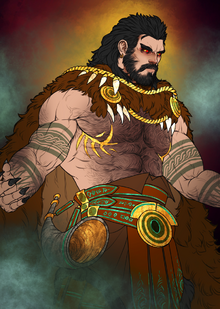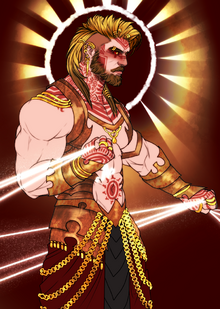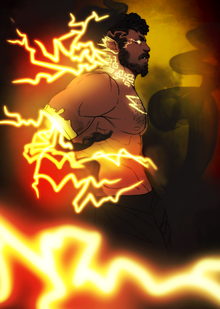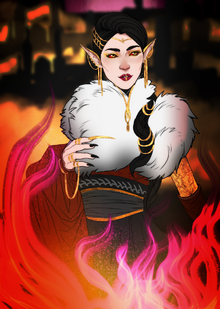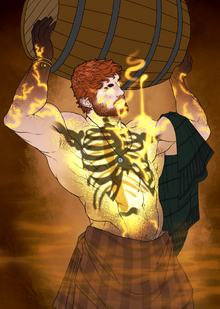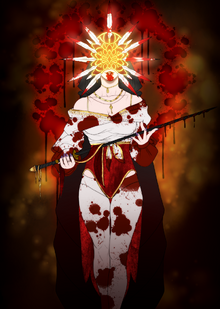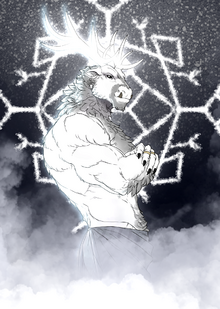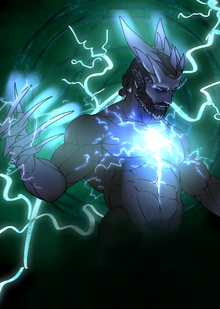|
|
| Line 1: |
Line 1: |
| Bev Moon - Rand Dark Moon☑️
| | Fornoss is one of the earliest Religions of the Ailor Race, that survived thousands of years of conversion by other Religions as well as attempts to be eradicated by various nations, as one of the few surviving so called [[Pagan Faiths]]. Unlike the other (mostly) dead Pagan Faiths, Fornoss has a large following, particularly among Velheim and Gallovian Ailor, though a large number of Urlan, Dwarves, and some Ashhaven Eronidas also follow it, meaning it is not limited in scope to just Ailor. Fornoss is sometimes also called the Old Gods Religion, but this is not a historically correct term. The Gods are not old from a pure chronological perspective, and it is certainly not the oldest Religion in Aloria. This term was mostly popularized by the Ailor, who when reviewing only their own history, can see Fornoss as the oldest Religion, but when taking the totality of the world's history, Fornoss is a more accurate term, which roughly translates to "Ancient us", an homage to its survival through the ages. |
| Leif Sun - Thirun Dark Sun ☑️
| | ==Origins== |
| Njal Light - Svol Shadow
| | ==Core Beliefs== |
| Dauw Order - Hrymrök Chaos
| | The Fornoss Gods are divided between two distinct Pantheons, the Eili who are generally considered mindful and virtuous but restrained, and the Vola who are generally considered opportunistic and selfish but powerful. The two Pantheons represent the two halves of any person's soul, filled with desire to do good by others, and desire to do good by one's self. It is important to stress here that there is no ontological morality that can be assigned to either Pantheon. While some Eili create the impression of being purely benign, they are in ways just as flawed as mortals and have desires and wants and needs that can cause them to commit great misdeeds, such as the time when Bard cut off Svol's arms because Svol refused to participate in Bard's punishment of the faithful for small misdeeds. Similarly, Hrymrøk foments chaos and anarchy wherever and whoever she touches, however even when cities crumble and burn, does the destruction give way to the liberation of the enslaved Fornoss followers that lived in the undercities. While generally speaking all Gods have good intentions for their followers, they are all equally capable of cruelty, misguidedness, deceitful or selfish actions to preserve their worship, which speaks to their vanity. However, because Soldi inherently represents helping others, and Svaldi represents using others, the faithful still draw lines in the sand and dictate morality on each other based on their personal beliefs, even if there is no theological reason to reinforce it. There are some people who worship only the Eili called Eilirik, and some people who only worship the Voli called Volirik, while a person who worships both is called a Hvarkirik. These three groups tend to conflict with one another for religious reasons, but usually unite when facing an external threat, like they did during the Skagger Wars against Regalians. Fornoss does not have a strict list of Virtues and Vices, rather, source the list of Soldi and Svaldi enriching activities from the Gods and Goddesses section. |
| Halfvel Blood - Eikki Corrupt Blood
| | |
| Bard Protection - Blodhrún Carnage
| | ===Soldi & Svaldi=== |
| ☑️ Elkonur Winter - Odal - Fear☑️
| | Soldi and Svaldi are two very important terms that accompany the Fornoss believers throughout all their lives. In the simplest of terms, Soldi is honor derived from virtue, while Svaldi is honor derived from opportunism. Soldi and Svaldi can be seen as resources that souls accrue in life as they grow older, and the goal of any Fornoss believer generally is to acquire high Soldi or Svaldi and be permitted into the afterlives of the Eili and Vola. Some might even consider trying to acquire both, a difficult balancing act, but if successful, might result in the very Gods themselves playing games of skill and wit to secure the soul for their own afterlives. This can sometimes result in a so-called Hvitdraugr, who is Undead Draugr until such a time comes that the Gods have finished their conflict over the person's soul (if they stay alive for that long in an Undead unfriendly world). Finally, it is also possible to lose Soldi or Svaldi from actions that go against the tenets of the Gods. It is in fact possible to lose all Soldi or Svaldi all at once, but this is usually not a complete disaster. Either honor can be restored, and can in fact be restored by another person. It is not uncommon for a father to lose all Soldi, resulting in their son beginning a quest to restore Soldi in his name. When offering his achievements up to the Gods, he offers them in his father's name, resulting in the Gods restoring the Soldi of his father. It is even possible to do this for people who have already died and passed into Imellomgård (purgatory), or who have come back from Imellomgård as Draugr Undead. In such a case, the living must restore their Soldi or Svaldi, after which they are released and restored to the proper afterlife, and in rare cases, to life either as a living person or a Revenant Spirit. |
| | |
| | ===Eiliheim & Volaheim=== |
| | Unlike all other Religions, Old Gods has two afterlives, the Eiliheim which is the paradise of the Eili Pantheon, and the Volaheim which is the paradise of the Vola Pantheon. There exists also a realm in between, but this is not really classified as a paradise and more like a purgatory called Imellomgård, which literally translates to the land in between. While Eiliheim and Volaheim are described as places filled with the luxuries of life and pleasures of mortal life made immortal, Imellomgård is a land devoid of color, song, happiness and purpose, where souls who are refused entry into the other afterlives are forced to wander for all eternity. To enter Eiliheim, a person must have high Soldi, and to enter Volaheim, a person must have high Svaldi. If a person has neither in adequate quantity, or offended both Pantheons by having negative Soldi or Svaldi, they are condemned to Imellomgård to wander the mirror-wastes for all eternity. Though, Undead sometimes come back from Imellomgård in the form of Draugr Undead, if their bodies were not properly interred in the Helbolwen burial sites. |
| | |
| | ===Svartskra=== |
| | The Svartskra identifies a pivotal point in Fornoss history that despite its massive importance to all Fornoss believers, is mostly shrouded in mystery either by the Eili forcing the faithful to forget, or the people willingly abandoning any reference to this period to avoid the stray faithful from looking too deep into the matter and opening old wounds. As part of the Fornoss origins, the so-called Vaarda Gates, exist all over the world visited by Fornoss followers, helping their early colonizing boom. It is said by the Eili that these Gates were built by Bev, and passed through Volaheim to fold time and space together, allowing instant transportation across vast distances. At some point, the relationship between the Fornoss believers and the Eili, as opposed to the Vola and their Spirits, turned sour. It is said by the Eili that Rand (who they call the Great Betrayer) tricked them and condemned the Fornoss followers to some kind of horrible fate, thus causing their rebellion against the Pact that was meant to save the early Velheim people from Elven enslavement. From this point it is unclear if the Fornoss believers were expelled or fled from the Volaheim Gates. Whatever the circumstances, the Gates were closed shut after everyone was out with Bev's Keys (Artifact Weapons), which were then scattered across the world. The Vola maintain that the Eili fomented a false rebellion and that the followers defaced the Vola in their own home, though whichever version is closer to the truth, is hard to say as both sides have motive to lie. The last side effect of Svartskra (the day the Gates shut), was that the two Eili who had brokered the deals with the Vola the Flesh God Gro and the Metal God Jord were banished by the Eili and stripped from the Pantheon. Similarly, the Vola banished the two Gods responsible for working out the deal with the Eili being the Revenge God Asbjørn and the Greed God Frynni, who were also stripped from the Pantheon. Since this day, the Eili and Vola have been immortal enemies. As a consequence of this animosity, both sides agreed to refrain from interfering with the faithful too much, so as to prevent all out holy war within the Religion. This explains why the Fornoss Gods have been exceptionally silent during major tragedies that struck for example the Velheim people in the past 300 years, however in recent years, this policy has shown signs of cracking, with some raising concerns that if the Gods get too involved, that they will start fighting each other. |
| | |
| | ==Gods and Goddesses== |
| | |
| | |
| | |
| | Draconism has several Gods (gender indeterminate, though when humanoid, they do appear gendered), making it a polytheistic Religion. Unlike many other polytheistic religions, however, Draconism has a clear hierarchy and even a form of competitive rivalry between the so-called Dragon Thrones. Every Dragon Throne (a group of Dragons) contains a leader who is the representative God, and the lesser named Dragons. These lesser named Dragons are not strictly Gods, but they are treated with great reverence. Not all Draconism Gods are currently alive, during the process of the Denial of Immortality, most Dragons died in a non-traditional sense (which also made the Religion "dead" for nearly 300 years save for areas like the Sihai Lands), with not all of them having been revived recently. It is possible to worship multiple Dragons, but because the Dragon Gods often conflict with one another even when they have a Dragon King, most Draconism followers worship a single God that best fits their principles and beliefs. |
|
| |
|
|
| |
|
Fornoss is one of the earliest Religions of the Ailor Race, that survived thousands of years of conversion by other Religions as well as attempts to be eradicated by various nations, as one of the few surviving so called Pagan Faiths. Unlike the other (mostly) dead Pagan Faiths, Fornoss has a large following, particularly among Velheim and Gallovian Ailor, though a large number of Urlan, Dwarves, and some Ashhaven Eronidas also follow it, meaning it is not limited in scope to just Ailor. Fornoss is sometimes also called the Old Gods Religion, but this is not a historically correct term. The Gods are not old from a pure chronological perspective, and it is certainly not the oldest Religion in Aloria. This term was mostly popularized by the Ailor, who when reviewing only their own history, can see Fornoss as the oldest Religion, but when taking the totality of the world's history, Fornoss is a more accurate term, which roughly translates to "Ancient us", an homage to its survival through the ages.
Origins
Core Beliefs
The Fornoss Gods are divided between two distinct Pantheons, the Eili who are generally considered mindful and virtuous but restrained, and the Vola who are generally considered opportunistic and selfish but powerful. The two Pantheons represent the two halves of any person's soul, filled with desire to do good by others, and desire to do good by one's self. It is important to stress here that there is no ontological morality that can be assigned to either Pantheon. While some Eili create the impression of being purely benign, they are in ways just as flawed as mortals and have desires and wants and needs that can cause them to commit great misdeeds, such as the time when Bard cut off Svol's arms because Svol refused to participate in Bard's punishment of the faithful for small misdeeds. Similarly, Hrymrøk foments chaos and anarchy wherever and whoever she touches, however even when cities crumble and burn, does the destruction give way to the liberation of the enslaved Fornoss followers that lived in the undercities. While generally speaking all Gods have good intentions for their followers, they are all equally capable of cruelty, misguidedness, deceitful or selfish actions to preserve their worship, which speaks to their vanity. However, because Soldi inherently represents helping others, and Svaldi represents using others, the faithful still draw lines in the sand and dictate morality on each other based on their personal beliefs, even if there is no theological reason to reinforce it. There are some people who worship only the Eili called Eilirik, and some people who only worship the Voli called Volirik, while a person who worships both is called a Hvarkirik. These three groups tend to conflict with one another for religious reasons, but usually unite when facing an external threat, like they did during the Skagger Wars against Regalians. Fornoss does not have a strict list of Virtues and Vices, rather, source the list of Soldi and Svaldi enriching activities from the Gods and Goddesses section.
Soldi & Svaldi
Soldi and Svaldi are two very important terms that accompany the Fornoss believers throughout all their lives. In the simplest of terms, Soldi is honor derived from virtue, while Svaldi is honor derived from opportunism. Soldi and Svaldi can be seen as resources that souls accrue in life as they grow older, and the goal of any Fornoss believer generally is to acquire high Soldi or Svaldi and be permitted into the afterlives of the Eili and Vola. Some might even consider trying to acquire both, a difficult balancing act, but if successful, might result in the very Gods themselves playing games of skill and wit to secure the soul for their own afterlives. This can sometimes result in a so-called Hvitdraugr, who is Undead Draugr until such a time comes that the Gods have finished their conflict over the person's soul (if they stay alive for that long in an Undead unfriendly world). Finally, it is also possible to lose Soldi or Svaldi from actions that go against the tenets of the Gods. It is in fact possible to lose all Soldi or Svaldi all at once, but this is usually not a complete disaster. Either honor can be restored, and can in fact be restored by another person. It is not uncommon for a father to lose all Soldi, resulting in their son beginning a quest to restore Soldi in his name. When offering his achievements up to the Gods, he offers them in his father's name, resulting in the Gods restoring the Soldi of his father. It is even possible to do this for people who have already died and passed into Imellomgård (purgatory), or who have come back from Imellomgård as Draugr Undead. In such a case, the living must restore their Soldi or Svaldi, after which they are released and restored to the proper afterlife, and in rare cases, to life either as a living person or a Revenant Spirit.
Eiliheim & Volaheim
Unlike all other Religions, Old Gods has two afterlives, the Eiliheim which is the paradise of the Eili Pantheon, and the Volaheim which is the paradise of the Vola Pantheon. There exists also a realm in between, but this is not really classified as a paradise and more like a purgatory called Imellomgård, which literally translates to the land in between. While Eiliheim and Volaheim are described as places filled with the luxuries of life and pleasures of mortal life made immortal, Imellomgård is a land devoid of color, song, happiness and purpose, where souls who are refused entry into the other afterlives are forced to wander for all eternity. To enter Eiliheim, a person must have high Soldi, and to enter Volaheim, a person must have high Svaldi. If a person has neither in adequate quantity, or offended both Pantheons by having negative Soldi or Svaldi, they are condemned to Imellomgård to wander the mirror-wastes for all eternity. Though, Undead sometimes come back from Imellomgård in the form of Draugr Undead, if their bodies were not properly interred in the Helbolwen burial sites.
Svartskra
The Svartskra identifies a pivotal point in Fornoss history that despite its massive importance to all Fornoss believers, is mostly shrouded in mystery either by the Eili forcing the faithful to forget, or the people willingly abandoning any reference to this period to avoid the stray faithful from looking too deep into the matter and opening old wounds. As part of the Fornoss origins, the so-called Vaarda Gates, exist all over the world visited by Fornoss followers, helping their early colonizing boom. It is said by the Eili that these Gates were built by Bev, and passed through Volaheim to fold time and space together, allowing instant transportation across vast distances. At some point, the relationship between the Fornoss believers and the Eili, as opposed to the Vola and their Spirits, turned sour. It is said by the Eili that Rand (who they call the Great Betrayer) tricked them and condemned the Fornoss followers to some kind of horrible fate, thus causing their rebellion against the Pact that was meant to save the early Velheim people from Elven enslavement. From this point it is unclear if the Fornoss believers were expelled or fled from the Volaheim Gates. Whatever the circumstances, the Gates were closed shut after everyone was out with Bev's Keys (Artifact Weapons), which were then scattered across the world. The Vola maintain that the Eili fomented a false rebellion and that the followers defaced the Vola in their own home, though whichever version is closer to the truth, is hard to say as both sides have motive to lie. The last side effect of Svartskra (the day the Gates shut), was that the two Eili who had brokered the deals with the Vola the Flesh God Gro and the Metal God Jord were banished by the Eili and stripped from the Pantheon. Similarly, the Vola banished the two Gods responsible for working out the deal with the Eili being the Revenge God Asbjørn and the Greed God Frynni, who were also stripped from the Pantheon. Since this day, the Eili and Vola have been immortal enemies. As a consequence of this animosity, both sides agreed to refrain from interfering with the faithful too much, so as to prevent all out holy war within the Religion. This explains why the Fornoss Gods have been exceptionally silent during major tragedies that struck for example the Velheim people in the past 300 years, however in recent years, this policy has shown signs of cracking, with some raising concerns that if the Gods get too involved, that they will start fighting each other.
Gods and Goddesses
Draconism has several Gods (gender indeterminate, though when humanoid, they do appear gendered), making it a polytheistic Religion. Unlike many other polytheistic religions, however, Draconism has a clear hierarchy and even a form of competitive rivalry between the so-called Dragon Thrones. Every Dragon Throne (a group of Dragons) contains a leader who is the representative God, and the lesser named Dragons. These lesser named Dragons are not strictly Gods, but they are treated with great reverence. Not all Draconism Gods are currently alive, during the process of the Denial of Immortality, most Dragons died in a non-traditional sense (which also made the Religion "dead" for nearly 300 years save for areas like the Sihai Lands), with not all of them having been revived recently. It is possible to worship multiple Dragons, but because the Dragon Gods often conflict with one another even when they have a Dragon King, most Draconism followers worship a single God that best fits their principles and beliefs.
Vanir Bev, Doorway of the Moon
- Name: This far Max This far Max This far Max This far Max This far Max This far Max
- Domain:
- Symbols:
- Role:
- Traits:
- Temple:
- Allies:
- Enemies:
- Rituals: Two full Lines
|
|
Aesir Rand, Herald the Dark Moon
- Name: This far Max This far Max This far Max This far Max This far Max This far Max
- Domain:
- Symbols:
- Role:
- Traits:
- Temple:
- Allies:
- Enemies:
- Rituals: Two full Lines
|
|
Vanir Leif, Warmth of the Fire
- Name: This far Max This far Max This far Max This far Max This far Max This far Max
- Domain:
- Symbols:
- Role:
- Traits:
- Temple:
- Allies:
- Enemies:
- Rituals: Two full Lines
|
|
Aesir Thirun, Fates of the Dark Sun
- Name: This far Max This far Max This far Max This far Max This far Max This far Max
- Domain:
- Symbols:
- Role:
- Traits:
- Temple:
- Allies:
- Enemies:
- Rituals: Two full Lines
|
|
Vanir Njal, Keeper of the Light
- Name: This far Max This far Max This far Max This far Max This far Max This far Max
- Domain:
- Symbols:
- Role:
- Traits:
- Temple:
- Allies:
- Enemies:
- Rituals: Two full Lines
|
|
Aesir Svol, Purveyor of Shadow
- Name: This far Max This far Max This far Max This far Max This far Max This far Max
- Domain:
- Symbols:
- Role:
- Traits:
- Temple:
- Allies:
- Enemies:
- Rituals: Two full Lines
|
|
Vanir Dáuw, Bringer of Order
- Name: This far Max This far Max This far Max This far Max This far Max This far Max
- Domain:
- Symbols:
- Role:
- Traits:
- Temple:
- Allies:
- Enemies:
- Rituals: Two full Lines
|
|
Aesir Hrymrök, The Charnel Chaos
- Name: This far Max This far Max This far Max This far Max This far Max This far Max
- Domain:
- Symbols:
- Role:
- Traits:
- Temple:
- Allies:
- Enemies:
- Rituals: Two full Lines
|
|
Vanir Halfvel, Father of Godly Blood
- Name: This far Max This far Max This far Max This far Max This far Max This far Max
- Domain:
- Symbols:
- Role:
- Traits:
- Temple:
- Allies:
- Enemies:
- Rituals: Two full Lines
|
|
Aesir Eikki, Drinker of the Blood Taint
- Name: This far Max This far Max This far Max This far Max This far Max This far Max
- Domain:
- Symbols:
- Role:
- Traits:
- Temple:
- Allies:
- Enemies:
- Rituals: Two full Lines
|
|
Vanir Bard, Bear-Lord of Protection
- Name: This far Max This far Max This far Max This far Max This far Max This far Max
- Domain:
- Symbols:
- Role:
- Traits:
- Temple:
- Allies:
- Enemies:
- Rituals: Two full Lines
|
|
Aesir Blodrúna, The Crimson Carnage
- Name: This far Max This far Max This far Max This far Max This far Max This far Max
- Domain:
- Symbols:
- Role:
- Traits:
- Temple:
- Allies:
- Enemies:
- Rituals: Two full Lines
|
|
Vanir Elkonur, The Winter Hunter
- Name: This far Max This far Max This far Max This far Max This far Max This far Max
- Domain:
- Symbols:
- Role:
- Traits:
- Temple:
- Allies:
- Enemies:
- Rituals: Two full Lines
|
|
Aesir Odal, Fear of the Dark
- Name: This far Max This far Max This far Max This far Max This far Max This far Max
- Domain:
- Symbols:
- Role:
- Traits:
- Temple:
- Allies:
- Enemies:
- Rituals: Two full Lines
|
|

